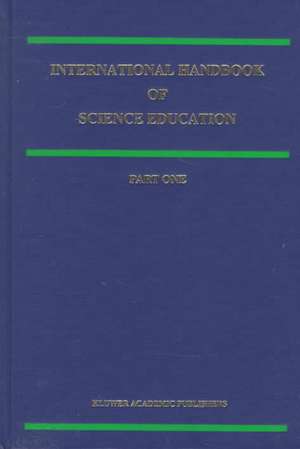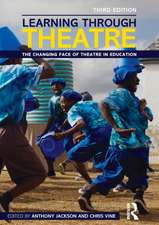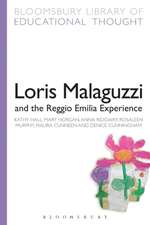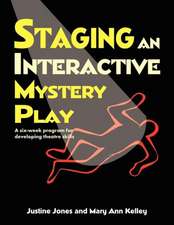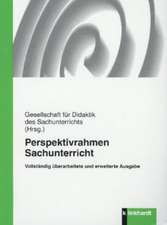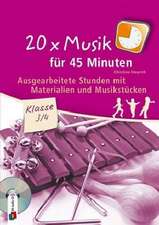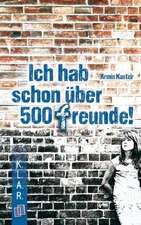International Handbook of Science Education: Springer International Handbooks of Education, cartea 2
Editat de B. Fraser, Kenneth Tobinen Limba Engleză Hardback – 30 apr 1998
| Toate formatele și edițiile | Preț | Express |
|---|---|---|
| Paperback (1) | 2629.64 lei 38-44 zile | |
| SPRINGER NETHERLANDS – 30 iun 2003 | 2629.64 lei 38-44 zile | |
| Hardback (1) | 3078.36 lei 3-5 săpt. | |
| SPRINGER NETHERLANDS – 30 apr 1998 | 3078.36 lei 3-5 săpt. |
Din seria Springer International Handbooks of Education
- 18%
 Preț: 2566.01 lei
Preț: 2566.01 lei - 20%
 Preț: 2524.89 lei
Preț: 2524.89 lei - 18%
 Preț: 2495.78 lei
Preț: 2495.78 lei - 18%
 Preț: 2787.65 lei
Preț: 2787.65 lei - 18%
 Preț: 2509.03 lei
Preț: 2509.03 lei - 18%
 Preț: 2528.13 lei
Preț: 2528.13 lei - 24%
 Preț: 3424.63 lei
Preț: 3424.63 lei - 18%
 Preț: 2557.33 lei
Preț: 2557.33 lei - 18%
 Preț: 4736.83 lei
Preț: 4736.83 lei - 18%
 Preț: 2500.50 lei
Preț: 2500.50 lei - 20%
 Preț: 3447.68 lei
Preț: 3447.68 lei - 18%
 Preț: 2562.04 lei
Preț: 2562.04 lei - 18%
 Preț: 1917.28 lei
Preț: 1917.28 lei - 18%
 Preț: 3868.23 lei
Preț: 3868.23 lei - 18%
 Preț: 3082.96 lei
Preț: 3082.96 lei - 18%
 Preț: 5421.52 lei
Preț: 5421.52 lei - 18%
 Preț: 4707.16 lei
Preț: 4707.16 lei - 18%
 Preț: 5517.65 lei
Preț: 5517.65 lei - 18%
 Preț: 3071.11 lei
Preț: 3071.11 lei - 18%
 Preț: 3089.10 lei
Preț: 3089.10 lei - 24%
 Preț: 2423.35 lei
Preț: 2423.35 lei - 24%
 Preț: 3706.67 lei
Preț: 3706.67 lei - 24%
 Preț: 2659.57 lei
Preț: 2659.57 lei - 24%
 Preț: 2731.14 lei
Preț: 2731.14 lei - 18%
 Preț: 4392.57 lei
Preț: 4392.57 lei - 24%
 Preț: 1695.06 lei
Preț: 1695.06 lei - 24%
 Preț: 2733.86 lei
Preț: 2733.86 lei - 24%
 Preț: 2638.94 lei
Preț: 2638.94 lei - 24%
 Preț: 1629.97 lei
Preț: 1629.97 lei - 24%
 Preț: 1863.18 lei
Preț: 1863.18 lei - 24%
 Preț: 3410.60 lei
Preț: 3410.60 lei - 24%
 Preț: 2649.91 lei
Preț: 2649.91 lei - 24%
 Preț: 2581.81 lei
Preț: 2581.81 lei - 24%
 Preț: 3592.50 lei
Preț: 3592.50 lei - 24%
 Preț: 2698.04 lei
Preț: 2698.04 lei - 24%
 Preț: 2642.96 lei
Preț: 2642.96 lei - 24%
 Preț: 2712.48 lei
Preț: 2712.48 lei - 24%
 Preț: 4135.01 lei
Preț: 4135.01 lei - 24%
 Preț: 3656.36 lei
Preț: 3656.36 lei
Preț: 3078.36 lei
Preț vechi: 3754.10 lei
-18% Nou
Puncte Express: 4618
Preț estimativ în valută:
589.12€ • 612.78$ • 486.35£
589.12€ • 612.78$ • 486.35£
Carte disponibilă
Livrare economică 24 martie-07 aprilie
Preluare comenzi: 021 569.72.76
Specificații
ISBN-13: 9780792335313
ISBN-10: 0792335317
Pagini: 1271
Ilustrații: XXX, 1271 p. 11 illus. In 2 volumes, not available separately.
Dimensiuni: 155 x 235 x 75 mm
Greutate: 2.27 kg
Ediția:1998
Editura: SPRINGER NETHERLANDS
Colecția Springer
Seria Springer International Handbooks of Education
Locul publicării:Dordrecht, Netherlands
ISBN-10: 0792335317
Pagini: 1271
Ilustrații: XXX, 1271 p. 11 illus. In 2 volumes, not available separately.
Dimensiuni: 155 x 235 x 75 mm
Greutate: 2.27 kg
Ediția:1998
Editura: SPRINGER NETHERLANDS
Colecția Springer
Seria Springer International Handbooks of Education
Locul publicării:Dordrecht, Netherlands
Public țintă
ResearchCuprins
Section 1: Learning. Editors: R. Duit, D.F. Treagust. 1.1. Learning in Science: From Behaviourism Towards Social Constructivism and Beyond; R. Duit, D.F. Treagust. 1.2. New Perspectives on Language in Science; C. Sutton. 1.3. Cultural Aspects of Learning Science; W.W. Cobern, G.S. Aikenhead. 1.4. Learning Science Through Models and Modelling; J.K. Gilbert, C.J. Boulter. 1.5. Learning About Science Teaching: Perspectives From an Action Research Project; P.H. Scott, R.H. Driver. 1.6. Scientific Inquiry Within Reach of Young Children; K.E. Metz. 1.7. Theories of Knowledge Acquisition; C.A. Chinn, W.F. Brewer. 1.8. The Epistemology of Students: The 'Thingified' Nature of Scientific Knowledge; J. Désautels, M. Larochelle. Section 2: Teaching. Editor: K. Tobin. 2.1. Issues and Trends in the Teaching of Science; K. Tobin. 2.2. A View of Quality in Teaching; J.R. Baird. 2.3. Teaching and Learning as Everyday Activity; W.-M. Roth. 2.4. Teaching for Understanding in Pre-Secondary Science; W. Harlen. 2.5. Teaching for Conceptual Change; P.W. Hewson, et al. 2.6. The Role of Routine Problem Tasks in Science Teaching; P. Hobden. 2.7. The Complexity of Chemistry and Implications for Teaching; D. Gabel. 2.8. The School Science Laboratory: Historical Perspectives and Contexts for Contemporary Teaching; V.N. Lunetta. Section 3: Educational Technology. Editor: M.C. Linn. 3.1. The Impact of Technology on Science Instruction: HistoricalTrends and Current Opportunities; M.C. Linn. 3.2. Computer Microworlds and Scientific Inquiry: An Alternative Approach to Science Education; B.Y. White. 3.3. Realising Authentic Science Learning through the Adaptation of Scientific Practice; D.C. Edelson. 3.4. Can Technology Bring Students Closer to Science? N. Butler Songer. 3.5. Problem-Based MacroContexts in Science Instruction: Design Issues and Applications; R.D. Sherwood, et al. 3.6. Using Technology to Support Students' Artefact Construction in Science; M. Wisnudel Spitulnik, et al. 3.7. Integration of Experimenting and Modelling by Advanced Educational Technology: Examples from Nuclear Physics; H.P. Schecker. 3.8. Where You Want IT, When You Want IT: The Role of Portable Computers in Science Education; A.E. McFarlane, Y. Friedler. Section 4: Curriculum. Editor: J. van den Akker. 4.1. The Science Curriculum: Between Ideals and Outcomes; J. van den Akker. 4.2. Cooperative Learning in the Science Curriculum; R. Lazarowitz, R. Hertz-Lazarowitz. 4.3. Curriculum Change in Science: Riding the Waves of Reform; J. Wallace, W. Louden. 4.4. Science Curriculum: Transforming Goals to Practices; R.W. Bybee, N. Ben-Zvi. 4.5. Integrated Science and Mathematics Education: Evolution and Implications of a Theoretical Model; D.F. Berlin, A.L. White. 4.6. The Learning Cycle Approach as a Strategy for Instruction in Science; M.R. Abraham. Section 5: Learning Environments. Editor: B. Fraser. 5.1. Science Learning Environments: Assessment, Effects and D
Caracteristici
Consists of 77 chapters arranged into 10 sections pertaining to the most significant issues in science education The most authoritative resource yet produced in science education Includes supplementary material: sn.pub/extras
